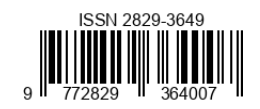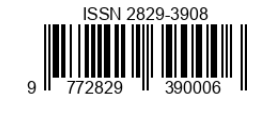Deixis and References in The Alice in Wonderland Movie
DOI:
https://doi.org/10.56910/literacy.v4i1.2132Keywords:
anaphoric, cataphoric, deixis, movie, referencesAbstract
This study, entitled “Deixis and References in the Alice in Wonderland Movie,” aims to identify various types of deixis and analyze the reference of the meaning of each type of deixis used in the movie Alice in Wonderland. The data source was obtained from the Alice in Wonderland movie, an American fantasy film directed by Tim Burton and produced by Walt Disney Pictures, released on February 25, 2010, based on a screenplay by Linda Woolverton. This study uses a qualitative method with documentation and observation techniques. The data was taken from Scripts.com and completed with repeated movie viewing. The steps include downloading the script, watching the movie, identifying utterances containing deixis, and analyzing them according to Levinson’s (1983) deixis theory and Cruse’s (2006) reference theory. The analysis is presented using informal descriptive methods. The results of this study indicated that five types of deixis were employed in the movie: person deixis, place deixis, temporal deixis, discourse deixis, and social deixis. The movie Alice in Wonderland (2010) data represented each type of deixis. The analysis revealed that each deixis category appeared with varying frequency: 334 instances of personal deixis, 35 instances of place deixis, 27 instances of time deixis, 87 instances of discourse deixis, and 41 instances of social deixis. These findings suggest that personal deixis was the dominant type used by the characters in the movie, emphasizing the role of speaker-hearer reference in the narrative discourse. Furthermore, two kinds of reference were found, anaphora and cataphora.
References
Anonymous. (2010). Alice in Wonderland (2010) movie script. Scripts.com. https://www.scripts.com/script/alice_in_wonderland_110
Cairns, B., & Lund University, Department of Linguistics. (1991). Spatial deixis. Working Papers, 38, 19–28.
Creswell, J. W. (2013). Qualitative inquiry and research design: Choosing among five approaches (3rd ed.). SAGE Publications.
Cruse, A. D. (2006). A glossary of semantics and pragmatics. Edinburgh University Press.
Fillmore, C. J. (1975). Lectures on deixis 1971. Indiana University Linguistics Club.
Fromkin, V. (2009). An introduction to language. Michael Rosenberg.
Griffiths, P. (2006). An introduction to English semantics and pragmatics. Edinburgh University Press.
Grundy, P. (2000). Doing pragmatics. Hodder Arnold.
Khalili, E. (2017). Deixis analysis in A Tale of Two Cities written by Charles Dickens. International Academic Journal of Social Sciences, 4(3), 58–65. https://www.academia.edu/43400277/Deixis_Analysis_in_A_Tale_of_Two_Cities_written_by_Charles_Dickens
Leech, G. (1983). Principles of pragmatics. Penguin.
Levinson, S. C. (1983). Pragmatics. Cambridge University Press.
Lyons, J. (1983). Introduction to theoretical linguistics. Cambridge University Press.
Lyson, J. (1977). Deixis and anaphora. Edinburgh University Press.
Marhannudin, F. M. (2022). A pragmatic analysis of deixis used in the song lyrics of “In the Lonely Hour” by Sam Smith [Undergraduate thesis, Hassanudin University].
Puteri, D., et al. (2022). The use of deixis in World Travel Magazine. International Journal of Linguistics, Literature and Culture, 8(3), 104–110. https://doi.org/10.21744/ijllc.v8n3.2088
Suciana, D. (2024). An analysis of deixis in the main character in “Front of the Class” movie [Undergraduate thesis, Raden Intan State Islamic University, Lampung].
Sudaryanto. (1993). Metode dan aneka teknik analisis bahasa: Pengantar penelitian wahana kebudayaan secara linguistis. Duta Wacana University Press.
Sugiyono. (2018). Metode penelitian kuantitatif, kualitatif, dan R&D. Alfabeta.
Yule, G. (1996). Pragmatics. Oxford University Press.
Downloads
Published
How to Cite
Issue
Section
License
Copyright (c) 2025 LITERACY : International Scientific Journals of Social, Education, Humanities

This work is licensed under a Creative Commons Attribution-ShareAlike 4.0 International License.







